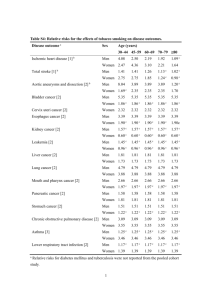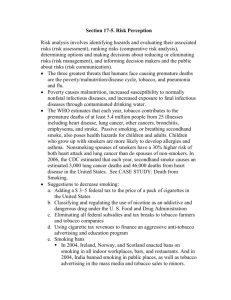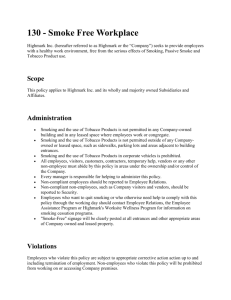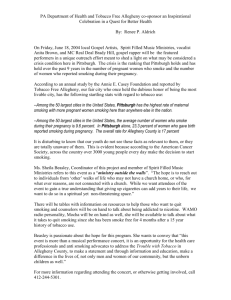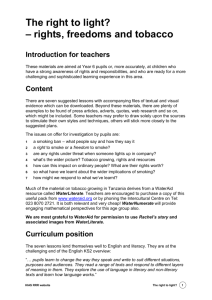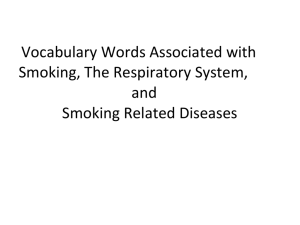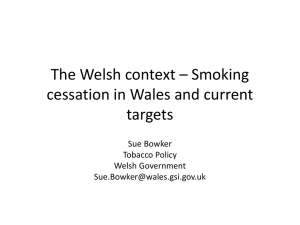ICA 'Free Speech Wars' - Action on Smoking and Health
advertisement
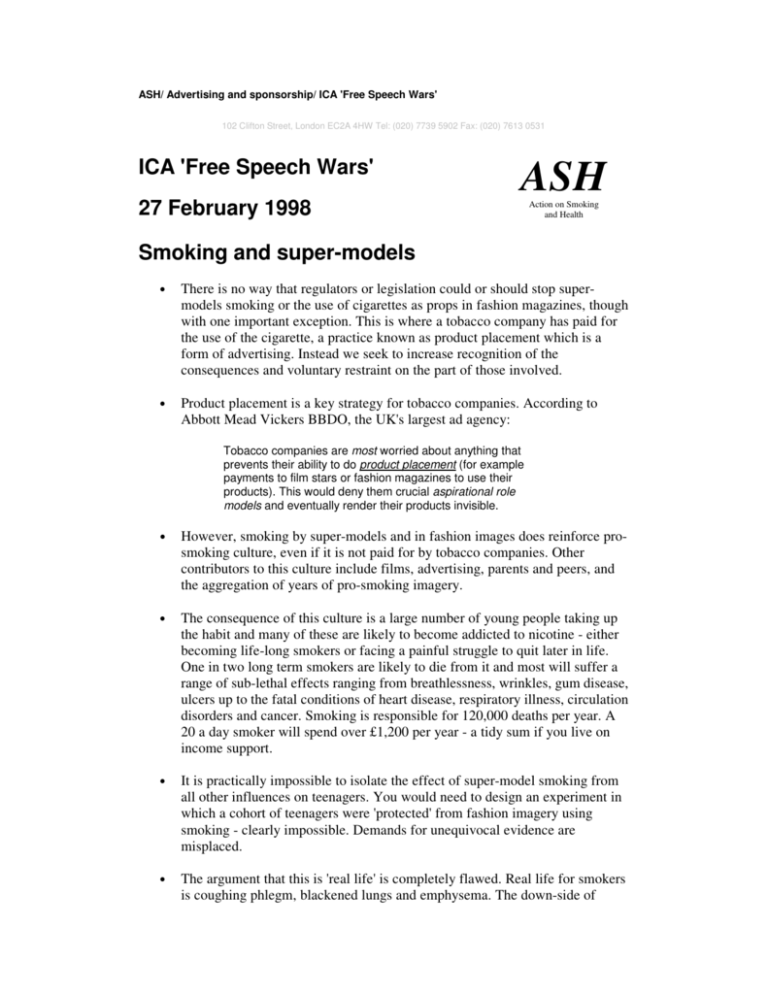
ASH/ Advertising and sponsorship/ ICA 'Free Speech Wars' 102 Clifton Street, London EC2A 4HW Tel: (020) 7739 5902 Fax: (020) 7613 0531 ICA 'Free Speech Wars' ASH 27 February 1998 Action on Smoking and Health Smoking and super-models • There is no way that regulators or legislation could or should stop supermodels smoking or the use of cigarettes as props in fashion magazines, though with one important exception. This is where a tobacco company has paid for the use of the cigarette, a practice known as product placement which is a form of advertising. Instead we seek to increase recognition of the consequences and voluntary restraint on the part of those involved. • Product placement is a key strategy for tobacco companies. According to Abbott Mead Vickers BBDO, the UK's largest ad agency: Tobacco companies are most worried about anything that prevents their ability to do product placement (for example payments to film stars or fashion magazines to use their products). This would deny them crucial aspirational role models and eventually render their products invisible. • However, smoking by super-models and in fashion images does reinforce prosmoking culture, even if it is not paid for by tobacco companies. Other contributors to this culture include films, advertising, parents and peers, and the aggregation of years of pro-smoking imagery. • The consequence of this culture is a large number of young people taking up the habit and many of these are likely to become addicted to nicotine - either becoming life-long smokers or facing a painful struggle to quit later in life. One in two long term smokers are likely to die from it and most will suffer a range of sub-lethal effects ranging from breathlessness, wrinkles, gum disease, ulcers up to the fatal conditions of heart disease, respiratory illness, circulation disorders and cancer. Smoking is responsible for 120,000 deaths per year. A 20 a day smoker will spend over £1,200 per year - a tidy sum if you live on income support. • It is practically impossible to isolate the effect of super-model smoking from all other influences on teenagers. You would need to design an experiment in which a cohort of teenagers were 'protected' from fashion imagery using smoking - clearly impossible. Demands for unequivocal evidence are misplaced. • The argument that this is 'real life' is completely flawed. Real life for smokers is coughing phlegm, blackened lungs and emphysema. The down-side of smoking rarely makes it into fashion shoots. In fact, smoking is a versatile prop which can convey moods ranging through stressed, aggressive, cool, laidback, impish, sleazy - all simply by adjusting the way the cigarette is held. • What should happen? This really rests with the industry and the men and women themselves. They are extremely influential role models and fashion magazines are influential and that their actions lead via a chain of cause and effect to people getting ill and dying. They can choose to ignore this or recognise that with their influence and prominence come responsibilities.. Noone can stop them being irresponsible, but one can hope they will not be. One super-model that has taken an anti-smoking campaigning role is Christy Turlington who describes her experiences in February's Frank magazine. • In other areas, there are limits on editorial freedom to use smoking. The ITC has a code in which TV drama is required not to use smoking unless strongly justified by plot and character. This recognises that TV is an enormously powerful medium and that there are responsibilities linked to the use of such a powerful communications vehicle. In our view, fashion is not that much different. • However, we fear that the fashion industry and modelling profession is one of the more frivolous and vacuous industries in public life and that it is more likely to be a follower than a leader. For this reason we advocate large budgets for anti-tobacco advertising - in California c. US$3.50 per head is spent. This would equate to c. £100 million in the UK - many times the current antismoking advertising budget of £2 million and the £5 million spent on all national programmmes. General points about tobacco promotion and free speech • Any state intervention in the communications between individuals or organisations raises civil liberties questions. The tobacco industry has traditionally argued that smoking is a private pastime, in which people knowingly assume risks in return for pleasure and that the state should have no role in regulating this activity or its promotion. The Government has decided to ban tobacco advertising, sponsorship and promotion of tobacco products. • Some industries have developed the notion of 'corporate free speech'. In our view, this is not an important universal principle to fight for - it is much more important that democratic control is applied to the actions of corporations. For most this will not be problematic - but for the tobacco industry with its enormously harmful and addictive product, it has been a challenge to its freedom. Corporations have a massively amplified voice - in the case of tobacco around £100 million is spent in the UK each year. In other words, the Government as a representative of the people constrains the power of corporation to do and say just what they like. This is not a new principle adverts have had to be 'legal honest decent and truthful' for years and this is not unrestrained free speech. Individual free speech is of course an important value to be cherished and maintained at all costs. • In general ASH argues that tobacco is a highly unusual special case, with very serious health implications and addictiveness. We do not argue for a ban on smoking. The civil liberties arguments in favour of a comprehensive ban on tobacco promotion can be grouped under the following headings: o o o o The right to be told the truth and the inherent deception in tobacco promotion Harm to others, especially children and non-smokers through passive smoking and promotion of pro-tobacco culture Addiction as an assault on the freedom to choose not to smoke Precedent (eg. Valium) and the 'twilight' legal status of tobacco Clive Bates Director, Action on Smoking and Health (ASH) 27 February 1998 Registered Charity No 262067 Action on Smoking and Health is a company limited by guarantee. Registered in England No 998971. Registered address as above.
